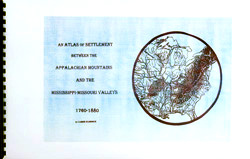 In past weeks I have reviewed a number of atlases describing early trails and pathways that become the infrastructure of early America. Here are the atlases I have reviewed:
In past weeks I have reviewed a number of atlases describing early trails and pathways that become the infrastructure of early America. Here are the atlases I have reviewed:
- An Atlas of Northern Trails Westward From New England
- An Atlas of Appalachian Trails to the Ohio River
- An Atlas of Southern Trails to the Mississippi
- An Atlas of Trails West of the Mississippi River
These early American trails, from the colonies, leading outward in the building of a nation, were just the beginning. With the trails came settlements. These settlements spread and grew as more and more people arrived in America, as people sought new ways and new places to make their fortunes or sought to establish a solid life for themselves and their families. So, were the Atlases of the early trails leave off, a new Atlas of early and expanding settlements picks up. An Atlas of Settlement Between the Appalachian Mountains and the Mississippi-Missouri Valleys 1760-1880 reveals the growth of America beyond the colonies.
At 11″ x 17″ this Atlas offers maps at a size which are easy to read. Unlike the other atlases reviewed so far, theses maps include color highlight details. Mixed with the maps are an extensive background to the early settlers, their migrations, and the importance of these towns and trails. With two columns per text page, each the size of a standard page, this book is the equivalent to a book twice as thick. Below are the Table of Contents followed by a listing of the Maps and Illustrations in the order in which they appear in the book.
Table of Contents
Introduction
I. Colonial Settlement in Early America
II. The Appalachian Barrier
III. 1754-1776 An Age of Speculation
- First Settlement Beyond the Appalachians
- The Ohio River Valleys 1754-1800
IV. 1776-1795 War and Western Settlement
V. 1795-1815 Appalachian Plateau Settlement
- A Western Problem
- Surveys and Land Sales
- The Northwest Territory
- Ohio – Western Template
VI. 1803-1840 Opening the Mississippi Valley
- Old Southwest Territory
- Southwest Settlement and Indian Removal
- The Era of Flat Boats and Pirates
- New Orleans and Louisiana
VII. 1820-1845 GTT – Gone to Texas
VIII. 1815-1850 Settlement of the Great Lake Region
- The Canal Era and the First Immigrant Wave
- The Changing Frontier
IX. 1840-1880 Settlement – Northern Great Plains
Bibliography
Maps and Illustrations
- Settlement
- ?
- Crossing the Appalachians
- Settlement and America’s Rivers
- Proposed Land Grants and Colonies 1740-1770
- Proposed Land Grands and Colonies 1760-1790
- Ohio River Tributaries – Settlement 1770-1785
- Forts of Pennsylvania, Maryland and Virginia
- Area and Population of Colonial America
- Population Density
- Soldiers Destinations
- The Western Frontier 1772-1796
- Western Populations
- The Western Frontier 1800-1803
- First Ohio Settlement Areas
- Ohio Stream Watersheds
- Wabash River System
- Settlement Along the Lower Ohio River
- Settlement 1815-1830
- Tennessee Settlement
- Indian Land Cessions 1800-1815
- Southwest Territory 1798-1814
- Mississippi Settlement 1827
- Alabama Settlement 1819
- Louisiana Settlement 1805
- The Louisiana Purchase
- Missouri Settlement 1821
- Texas Settlement 1834
- Arkansas Settlement 1829
- Frontier Advance 1820
- Northeast Pioneer Advance 1798
- Northeast Pioneer Advance 1810
- Foreign Born Population
- Canals and Roads West
- Lower Lake Plains Settlement
- Upper Lakes Settlement
- Upper Mississippi Settlement
- Population of Western Cities
- Millions of Acres
- Colonial Population – United States Population
45. Ethic Corners of America
Order a copy of Settlement Between the Appalachian Mountains and the Mississippi-Missouri Valleys 1760-1880 from Family Roots Publishing; Item #: CE06, Price: $19.60.
Thanks for this review. It sounds like the exact atlas I need at the moment. I just checked and my local library has a reference copy. Woot!!
Hello I am really interested in my families heritage and such. I don’t really know how to start this but my families names were Morrison and Higgins in the Appalachian mountains. Would you have any guidance to lend. I can’t really afford the name brand family tree websites.
Thank you very much, hope it don’t sound crazy 🙂
Richard Michael Anthony Petro